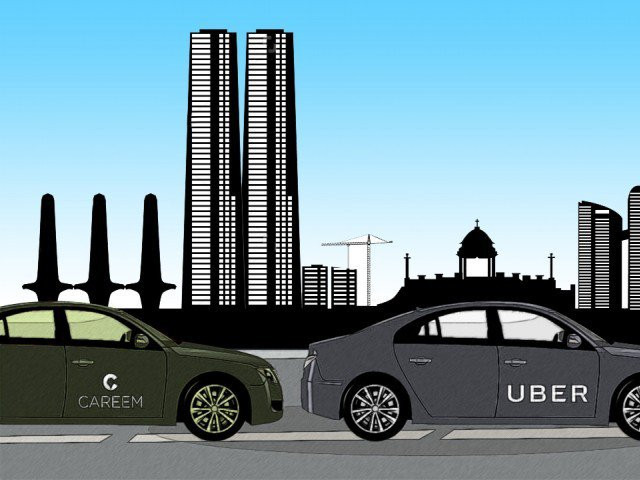Ride-hailing services struggle
Transport facilities now functioning at just 50% of their capacity

Enduring a dent from the lockdowns imposed in Pakistan to curb the spread of coronavirus, the ride-hailing services are struggling to restore normalcy in their operations. In the aftermath of the Covid-19 pandemic, transport facilities could only recover up to 50% of their capacity until now, however, food and medicine delivery businesses have reported modest growth.
Covid-19 had a severe impact on the demand for ride-hailing services as major parts of the country remained under lockdown for an extended period and services were suspended in the region.
“As countries have started to lift travel restrictions, we have seen a recovery in demand for ride-hailing services,” said Uber Pakistan General Manager Saad N Pall in comments to The Express Tribune.
“However, as a business, the safety of riders and partnerdrivers remains a priority.” He pointed out that the current unprecedented times, emerging on the back of Covid-19 pandemic, had transformed business strategies on a global scale.
“Currently, we are witnessing a positive trend as people are reviving their regular routines, however, as Covid-19 cases are on the rise again, we cannot accurately project how long it will take to recover completely,” said the general manager.
He stated that Uber Delivery had gained popularity since its introduction during the Covid-19 pandemic in Pakistan.
The official detailed that the service was added to company’s portfolio at a time when the pandemic was at its peak in Pakistan and it was aimed at conveniently delivering essential items such as groceries and medicines while ensuring social distancing of riders.
Apart from that, the company was experiencing a strong recovery in Uber’s low-cost ride options, he said.
“Under the current circumstances, people are looking for economical options of transportation and lowcost rides of Uber are in high demand,” he said.
According to Pall, the biggest challenge for the ride-hailing services is the significant drop in demand since the pandemic began.
“Given that we have no clear view regarding the end of the pandemic and the challenges it will pose, we have taken swift action on everything that is in our control,” he said.
“We have invested significantly to ensure that every driver on the platform has access to safety kits and personal protective equipment.” He added that the company introduced a new facial recognition technology to be certain that drivers were wearing masks.
Plastic in-car separators have been installed in highly active Uber vehicles to add a layer of protection between the riders and drivers. “Furthermore, we utilised technology to introduce new services including Uber Medics, Uber Delivery and Uber by the Hour to meet the evolving demand,” he said.
Pall appreciated the government’s measures aimed at promotion of disruptive technologies. He offered full support of the company for the development of regulations that would further promote the use of affordable and convenient transportation for the masses, while creating multiple economic opportunities.
Careem spokesperson Madiha Javed Qureshi said there had been a severe impact of the situation but the industry also saw a rise in demand for other verticals such as delivery of food and items of essential needs.
She added that since the lockdown was lifted and services of the firm resumed, the demand for ride-hailing service was far below pre-Covid levels.
“The industry is seeing a slow yet consistent rise in demand for our service and at this rate, we expect full recovery and return to normalcy by December 2021,” said the Careem spokesperson.
The factors hindering full recovery included a general change in customer behaviour, who chose to avoid excessive outdoor movement, closure of schools and work-from-home policies implemented by many companies, she pointed out.
Additionally, the demand for lowcost products had a healthy recovery but demand for premium services still remained depressed, she added.
Careem has different kinds of customers who utilise different types of cars and its delivery service, she said.
“We are seeing a healthy growth in delivery segment along with a rapid recovery in lower fare car types such as bikes and go mini,” she said.
The biggest challenge facing the industry is to maintain the supply of vehicles and encourage captains to continue working with the company while also keeping prices attractive enough for customers to continue using the service, said Qureshi.
“The cost of doing business is constantly increasing, especially when it comes to the ride-hailing industry,” she said.
“We saw an increase in prices of vehicles over the past few years and the constant fluctuation in fuel prices is also impacting the cost of business for our current and potential captains.”
She detailed that the company was working with provincial and federal governments to uplift the digital ecosystem of Pakistan.
Hike in cost of doing business arising from rise in fuel prices and car prices makes it very difficult for the existing and potential Careem captains to use the service as a sustainable means of income.
“Ride-hailing industry should not be taxed as it is still in infancy stage in Pakistan,” she said. “Ease of doing business in terms of regulations and laws has to be guaranteed.”



















COMMENTS
Comments are moderated and generally will be posted if they are on-topic and not abusive.
For more information, please see our Comments FAQ